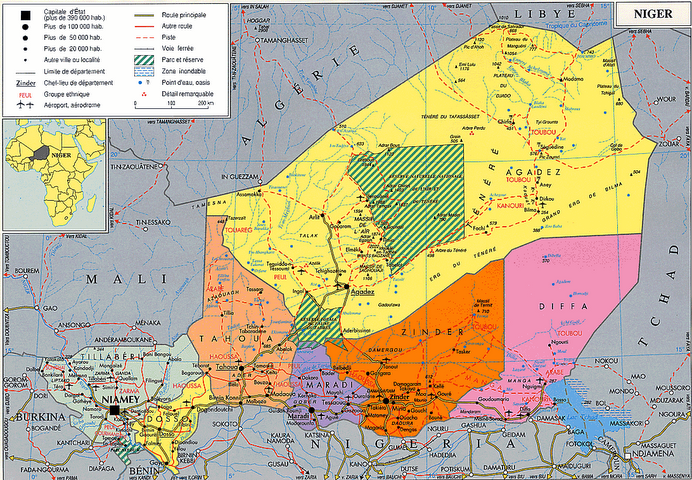
“Non, merci,” I say declining a plastic bag to cover each of my purchases from the corner store: one for the eggs, one for the bread, one for the chewing gum. The boutique owners here in Niamey, Niger always give me a quizzical look when I suggest that they place the purchases directly into my backpack.
Although many Americans will participate in Earth Day festivities this month, the official occasion to think about the state of the environment will go unnoticed here in the Republic of Niger in West Africa.
Plastic bags litter the streets, fill the open sewers, and hang like heavy fruit blowing in the breeze from the thorns of acacia trees. Every little purchase made in the market or in stores is shrouded in its own opaque black plastic bag. With a brief lifespan as a bag, the plastic is then tossed into the streets where it finally catches on thorns or becomes the source of clogging for an open sewer.
Niger’s environmental problems are large, and include deforestation, desertification, drought, pollution, in addition to serious issues resulting from poorly managed gold and uranium mining industries. Many of these could be mitigated with national policy measures, international support, and education. But the poor and corrupt Nigerien government experiences little environmental leadership from the developed world. So in the meantime, the lack of a waste disposal system, combined with a plethora of plastic, is choking the immediate environment.
Niger competes for the title of the poorest and least developed nation on earth. Its population is growing at a rate of 3 percent, and the pressures to survive on the edge of the Sahara desert are increasingly intense. It seems to be an odd twist of fate that gas prices soar around $5 per gallon here, a land-locked nation twice the size of Texas. Recent trade agreements with China make me wonder how much of that will translate into a Nigerien market flooded with even more cheaply manufactured plastic items.
And somehow, in a country where 82 percent of the population depends on agriculture and livestock for survival, few think twice about tossing trash out the car window, or discarding items in the streets as they walk.
Yet I find it hard to believe that environmentalism is a luxury permitted only to those with food and economic security. Speaking to a Nigerien friend about my concerns, he said, “I know, it is terrible- something has to change.” And finishing the last drops of yogurt from the plastic container, he tossed it over his shoulder with a shrug as we continued to walk down the street.
What does the future hold for the people and the environment of Niger? I am afraid that only time will tell.


No comments:
Post a Comment